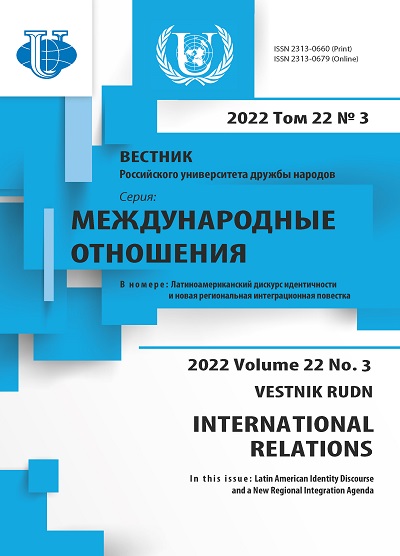Central America Facing the Bicentennial Crisis: Political Uncertainty, Economic Hardship and Climate Challenges
- 作者: Martí i Puig S.1,2, Rodríguez Suárez D.1,3
-
隶属关系:
- University of Girona
- CIDOB - Barcelona Center for International Affairs
- National University of Distance Education
- 期: 卷 22, 编号 3 (2022): Latin American Identity Discourse and a New Regional Integration Agenda
- 页面: 495-505
- 栏目: THEMATIC DOSSIER
- URL: https://journals.rudn.ru/international-relations/article/view/32171
- DOI: https://doi.org/10.22363/2313-0660-2022-22-3-495-505
如何引用文章
详细
Central America meets the bicentenary of its independence in the midst of a threefold crisis: a political crisis marked by democratic regression; an economic crisis resulting from the COVID-19 maelstrom and the subsequent collapse of international trade and tourism; finally, a humanitarian crisis generated by the pandemic and climate change. In this article we will focus our attention on how this triple crisis has hit five Central American republics - the three that make up the so called Northern Triangle, as well as Nicaragua and Costa Rica. This article will look at the political level by country and jointly address the problems created by the pandemic and the challenges and costs posed by the climate crisis. Based on the complex nature of the crisis the defended theses are threefold. The first is that the democracy of the prevailing political regimes has been eroded in the 21st century. In some cases, as a result of the collapse of the traditional party systems, in other cases due to a lack of public confidence, and in some cases due to the increase of power in the hands of presidents. The second thesis relates to unexpected natural phenomena, such as the COVID-19 pandemic and natural disasters, for instance, hurricanes. These phenomena increased the demands on weakened institutions and highlighted the precariousness in which the majority of the population lives. The third thesis points out that in order to cope with the political and humanitarian crisis many of the region’s citizens opted to migrate northwards. Central Americans’ individual preference for emigration implies the dismissal of the possibility of seeking social improvements through collective commitments and struggles in their own country.
作者简介
Salvador Martí i Puig
University of Girona; CIDOB - Barcelona Center for International Affairs
Email: salvador.marti@udg.edu
ORCID iD: 0000-0002-4464-4452
PhD (Political Science), Professor, University of Girona; Senior Researcher, CIDOB-Barcelona Centre for International Affairs
Girona, Spain; Barcelona, SpainDaniel Rodríguez Suárez
University of Girona; National University of Distance Education
编辑信件的主要联系方式.
Email: daniel.rodriguezsuarez@udg.edu
ORCID iD: 0000-0002-2693-8879
PhD (Contemporary History), Associate Professor, University of Girona; Professor/Tutor, National University of Distance Education (UNED)
Girona, Spain; Madrid, Spain参考
- Cascante Matamoros, J., & Aguirre Raftacco, E. C. (2020). Costa Rica. In S. Martí i Puig & M. Alcántara Sáez (Eds.), Política y crisis en América Latina. Reacción e impacto frente a la COVID-19 (pp. 113-130). Madrid: Marcial Pons.
- Cedillo Delgado, R. (2022). Nuevas Ideas de El Salvador. Un partido movimiento en América Latina. Apuntes Electorales, 21(67), 45-79.
- Cuadra Lira, E. (2016). Las élites y los campos de disputa en Nicaragua: una mirada retrospectiva. Península, 11(1), 85-101. https://doi.org/10.1016/j.pnsla.2016.01.004
- Eccleston-Turner, M., & Upton, H. (2021). International collaboration to ensure equitable access to vaccines for COVID-19: The ACT-Accelerator and the COVAX facility. Milbank Quarterly, 99(2), 426-449. https://doi.org/10.1111/1468-0009.12503
- Grassetti, J. (2020). El discurso político de Nayib Bukele en Twitter. Cuadernos del Centro de Estudios de Diseño y Comunicación, (112), 205-224. https://doi.org/10.18682/cdc.vi112.4102
- Guerrero Garnica, J. (2020). Una Guatemala colapsada antes de la pandemia. In S. Martí i Puig & M. Alcántara Sáez (Eds.), Política y crisis en América Latina. Reacción e impacto frente a la COVID-19 (pp. 183-199). Madrid: Marcial Pons.
- Jarquín, M. (2020). Nicaragua: dos crisis. In S. Martí i Puig & M. Alcántara Sáez (Eds.), Política y crisis en América Latina. Reacción e impacto frente a la COVID-19 (pp. 233-251). Madrid: Marcial Pons.
- Martí i Puig, S. (2019). Nicaragua: análisis de una crisis inesperada. Fundación Carolina. Documentos de Trabajo, (10), 1-23. Retrieved from https://www.fundacioncarolina.es/wp-content/uploads/2019/07/DT_FC_10.pdf
- Martí i Puig, S. (2021). Nicaragua 2021: elecciones autoritarias y represión 2021. Análisis Carolina, (19), 1-14. Retrieved from https://www.fundacioncarolina.es/wp-content/uploads/2021/06/AC-19. 2021.pdf
- Martí i Puig, S., & Rodríguez Suárez, D. (2021). Nicaragua: la COVID-19 y el Parlamento. In M. García Montero, M. Barragán Manjón & M. Alcántara Sáez (Eds.), Los parlamentos en América Latina en tiempos de pandemia (pp. 313-337). Madrid: Centro de Estudios Políticos y Constitucionales. Mº de la Presidencia.
- Pignataro, A., & Treminio, I. (2019). Reto económico, valores y religión en las elecciones nacionales de Costa Rica 2018. Revista de Ciencia Política, 39(2), 239-263. https://doi.org/10.4067/S0718-090X2019000200239
- Prunier, D. M., & Salazar, S. (2021). Fronteras centroamericanas y movilidad en 2020. Una región de fracturas y desigualdades impactada por el COVID-19. Estudios Fronterizos, 22, e073, 1-31. https://doi.org/10.21670/ref.2110073
- Rodríguez Ariano, L. N. (2020). Retrotopía: un anhelo del conservadurismo nativista estadounidense. In P. G. García Macías & J. S. Cueto-Calderón (Eds.), Movilidad humana en Latinoamérica: nuevos patrones, nuevos retos (pp. 63-81). London: Transnational Press.
- Rodríguez, C. G., & González Tule, L. A. (2020). Elecciones en Honduras 2017: Debilidad institucional e incertidumbre electoral. In M. Alcántara Sáez (Ed.), América Latina vota 2017-2019 (pp. 325-356). Madrid: Tecnos.
- Sosa, E. (2011). La contienda política tras el golpe de Estado oligárquico. De la resistencia en las calles hacia la disputa político/electoral. Bajo el Volcán, 11(17), 21-42. Retrieved from https://www.redalyc.org/articulo.oa?id=28625451004
- Torre Cantalapiedra, E., & Mariscal Nava, D. M. (2020). Batallando con fronteras: estrategias migratorias en tránsito de participantes en caravanas de migrantes. Estudios Fronterizos, 21, e047, 1-21. https://doi.org/10.21670/ref.2005047
- Treminio Sánchez, I. (2022). Elecciones presidenciales y legislativas Costa Rica 2022. Análisis Carolina, (5), 1-14. https://doi.org/10.33960/AC_05.2022
- Villafuerte Solís, D., & García Aguilar, M. C. (2020). Fin de la era Trump y las promesas de Biden: ¿nuevos aires en la política migratoria de la Cuarta Transformación? Migración y Desarrollo, 18(35), 103-127. Retrieved from https://www.redalyc.org/articulo.oa?id=66066759005








